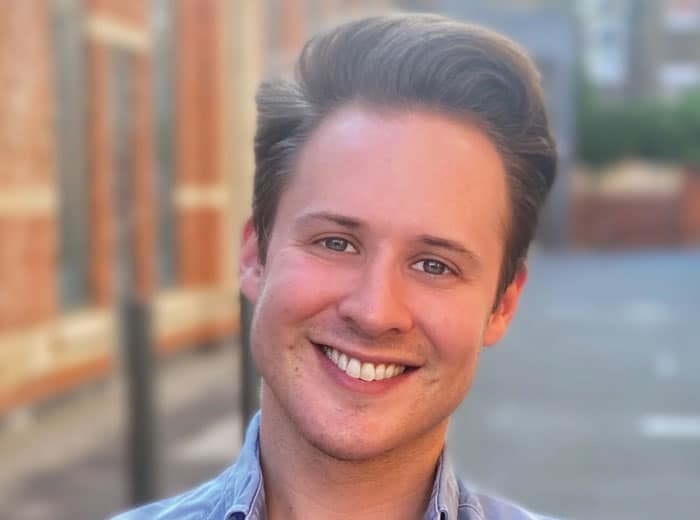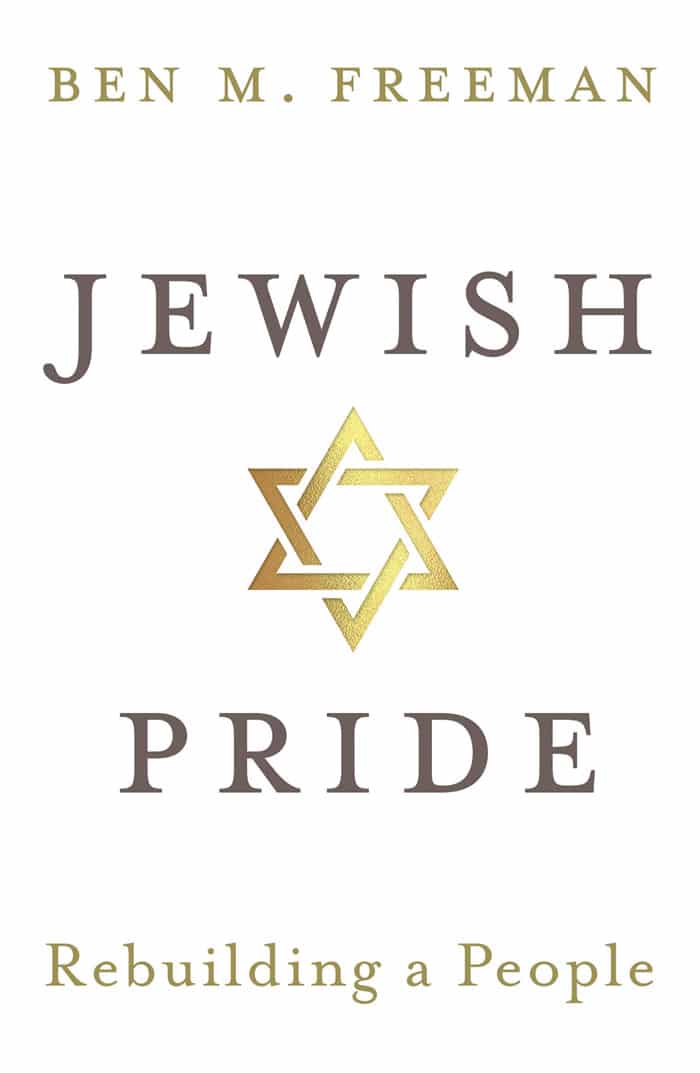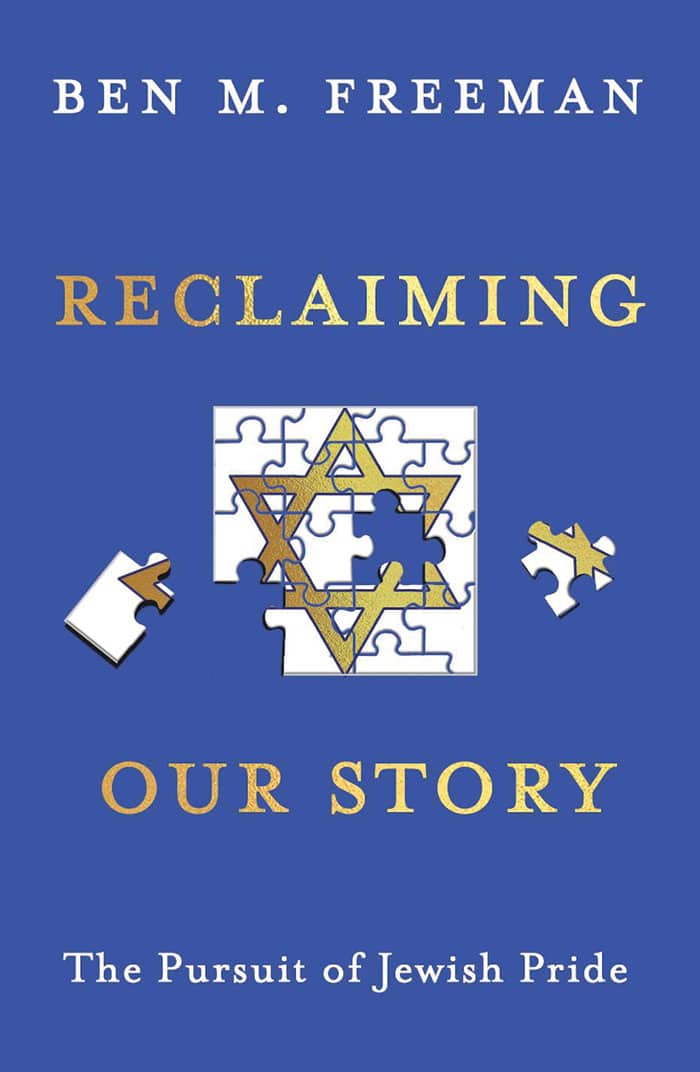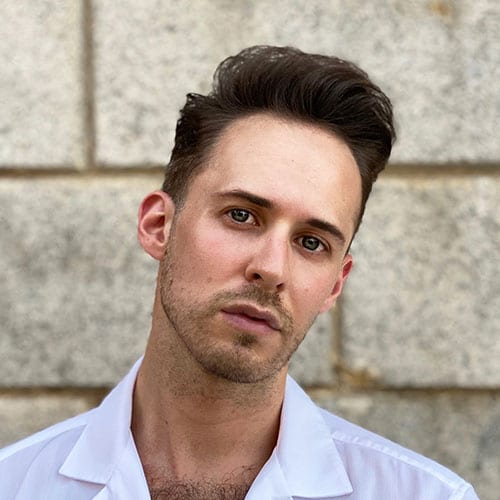 Courtesy of Ben M. Freeman
Courtesy of Ben M. Freeman “I have done nothing wrong.” These words echoed relentlessly in my mind as I stood in the upstairs bathroom of my parents’ house, battling against the weight of internalized homophobia and years of having endured mental anguish.
To my 16-year-old self, the significance of these words was profound, a revelation that would shape the course of my life. This realization became the turning point in the internal struggle I faced, one that encompassed both my identity as a gay person and later as a Jew. It marked the beginning of my transformative journey toward embracing LGBTQ+ pride, eventually leading me to write a book encouraging a modern Jewish Pride movement. Along this path, I discovered the profound healing power of pride.
Before embarking on this life-changing journey toward Jewish and Zionist pride, I was a teenager, weighed down by a seemingly insurmountable sense of shame. This shame inflicted immense pain, leading me to self-harm and to even attempt suicide. Regrettably, my story resonates with countless individuals worldwide. Shame, regardless of its source, is a corrosive force that damages those who forced to endure it.
The impact of shame on mental health has been studied extensively by experts such as Professors June Tangney of George Mason University and Ronda L. Dearing of the University of Houston. They found that “shame-proneness can also increase one’s risk for other psychological problems. The link with depression is particularly strong; for instance, one large-scale meta-analysis in which researchers examined 108 studies involving more than 22,000 subjects showed a clear connection.”
This shame marked the beginning of my personal journey, but the seed of self-esteem and confidence that was ignited in that bathroom at the age of 16 continued to grow within me. It was a gradual transformation, not an instant occurrence. As I entered my 20s, I actively embarked on a quest for LGBTQ+ pride. I had an unquenchable thirst for knowledge about my community and a deep desire to understand and belong to the LGBTQ+ community. Above all, I yearned to make peace with my true self. In my pursuit, I stumbled upon a film that would forever alter my life: “Milk,” a 2008 biopic about Harvey Milk, the first LGBTQ+ individual elected to office in the United States, who also happened to be Jewish. Little did I anticipate the profound impact it would have on me.
Anger became a vital indicator of my growing self-esteem. I was not consumed by it. I understood that it was okay to experience anger as part of my journey toward self-acceptance.
One scene from the film left a lasting impact on me. As Harvey Milk addressed a crowd of gay individuals, his words echoed in my soul: “I know you are angry. I am angry!” Those simple yet powerful words resonated deeply within me, prompting me to confront the anger stemming from my own experiences. At that moment, I came to a realization. Anger was not merely a negative emotion to suppress or ignore. It held a significant meaning: It hinted at a sense of self-worth, a sense of empowerment. I recognized that I had done nothing wrong, and I deserved better than the discrimination I had faced. Anger became a vital indicator of my growing self-esteem. I was not consumed by anger, nor did I let it define me. Instead, I allowed myself to feel it and acknowledged its presence. I understood that it was okay to experience anger as part of my journey toward self-acceptance.
At 36 years old, I take pride in my gay identity. As an openly gay teacher in Hong Kong, I was honored to serve as a role model for LGBTQ+ students, ensuring they never feel the pain I once did.
Despite my admiration for Jewish LGBTQ+ leaders like Harvey Milk, I initially viewed the two parts of my identity — Jewish and gay — as separate entities. I failed to recognize the commonalities and shared lessons that could be applied to both communities. However, it was through the concept of pride that I finally found a way to integrate these seemingly distinct aspects that defined who I was.
Driven by my years of educating about the Holocaust, I decided to join Twitter with a specific mission in mind: To confront Jeremy Corbyn, the then leader of the Labour Party, infamous for his racist attitudes toward Jews.
Driven by my years of educating about the Holocaust, I decided to join Twitter with a specific mission in mind: To confront Jeremy Corbyn, the then-leader of the Labour Party, infamous for his racist attitudes toward Jews. It gradually became clear to me that Corbyn embodied a form of Jew-hatred that I had personally experienced, even though I didn’t immediately recognize it.
My experience at Glasgow University was marred by left-wing Jew-hatred. This made me feel isolated and othered. Still, I refused to internalize the hate directed at me, however uncomfortable this pressurized atmosphere was to navigate. Given my background as a Holocaust educator and historian of historical Jew-hatred, as well as my own experiences at university, I felt equipped to understand Corbyn’s mindset and explain it to others. I aimed to convey these complex ideas in a way that was accessible to people around the world. Over time, my presence on Twitter grew, establishing me as a prominent young voice in the battle against Corbyn’s left-wing Jew-hatred.
During that period, I had the privilege of witnessing the remarkable strength and resilience of the British Jewish community. Their justified anger in response to the Labour Party’s betrayal left me in awe. From my vantage point in Hong Kong, I watched with admiration as British Jews orchestrated the powerful “enough is enough” campaign, standing up against Corbyn’s Jew-hatred. This rallying cry embodied the understanding that we deserved better treatment and should not tolerate such mistreatment. However, amid this empowering movement, I couldn’t help but notice certain high-profile Jews who seemed subdued by shame. They were unable to join the fight as they prioritized their affiliation with what David Hirsh, the British academic, terms the Leftist “Community of the Good” over their Jewish identity. It reminded me of the times I had tried to conform to society’s expectations of being a “good gay person,” suppressing aspects of my LGBTQ+ identity to fit into a palatable mold. This observation reinforced in me the importance of standing proudly in one’s identity, refusing to be silenced or diminished by shame or external expectations.
I began contemplating the profound psychological impact of Jew-hatred on the Jewish community. It was a moment of reckoning for British Jews, as we questioned our true acceptance in the country we have called home for centuries. This unsettling and traumatic experience left me personally affected. The relentless hate propagated by Corbyn’s followers, who targeted and vilified Jews online, shook me to the core. The realization that such events were unfolding in 21st-century Britain left me feeling isolated and filled with disbelief. It was like being trapped in a horrifying nightmare.
These experiences revealed a troubling reality: discussions about the true impact of Jew-hatred on Jews are rarely explored. While there is extensive analysis and investigation of acts of Jew-hatred, the focus often centers around the non-Jewish perspective. We examine their perceptions, feelings, and actions toward Jews. Yet, we seldom delve into the profound effect this relentless hatred has on our own self-perception and our Jewish identity, and as such we are left unable to defend ourselves.
In those powerful moments, I was struck with a surge of emotion as I realized: Jews deserve a pride movement. This wasn’t merely about individual pride (which many Jews undoubtedly feel), but about uniting to create a movement that educates, inspires and empowers us as a collective.
 When I initially broached the topic of Jewish Pride, some individuals believed that the slogan was for LGBTQ+ Jews only. I swiftly rejected this notion. Jewish Pride stands as a unique and distinct pride movement created specifically for the Jewish community. While its inception may have been inspired by my personal journey toward LGBTQ+ pride, it is essential to emphasize that Jewish Pride is inclusive and intended for all Jews.
When I initially broached the topic of Jewish Pride, some individuals believed that the slogan was for LGBTQ+ Jews only. I swiftly rejected this notion. Jewish Pride stands as a unique and distinct pride movement created specifically for the Jewish community. While its inception may have been inspired by my personal journey toward LGBTQ+ pride, it is essential to emphasize that Jewish Pride is inclusive and intended for all Jews.
As a result of this journey, I wrote a manifesto for a modern Jewish Pride movement in my book, “Jewish Pride: Rebuilding a People” in February 2021. The manifesto served as a rallying cry for Jews to unite and forge a pride movement that would educate and empower us.
As I cautioned in the book, pride should not be mistaken for superiority or blind adherence. Rather, this pride is grounded in a deep love and appreciation for our Jewishness, which can empower us to offer constructive criticism when it is warranted.
But as I cautioned in the book, pride should not be mistaken for superiority or blind adherence. Rather, this pride is grounded in a deep love and appreciation for our Jewishness, which can actually empower us to offer ourselves constructive criticism when it is warranted. Our community is far from perfect and Jewish Pride is hardly naive to that. We are diverse and argumentative and it is natural for us to hold differing opinions. However, as “am echad,” one people, we strive to find common ground through embracing pride in our shared heritage.
 In October 2022, I published my second book, “Reclaiming our Story: The Pursuit of Jewish Pride.” It delves into the concept of internalized anti-Jewishness, aiming to shed light on the profound impact of Jew-hatred on Jews. In it, I explore the notion of the broken mirror of Jewish identity, wherein the non-Jewish world imposes their own categories of “Good Jews” and “Bad Jews” onto us. Tragically, we often internalize and define ourselves through this distorted reflection. The consequences for Jewish identity have been devastating.
In October 2022, I published my second book, “Reclaiming our Story: The Pursuit of Jewish Pride.” It delves into the concept of internalized anti-Jewishness, aiming to shed light on the profound impact of Jew-hatred on Jews. In it, I explore the notion of the broken mirror of Jewish identity, wherein the non-Jewish world imposes their own categories of “Good Jews” and “Bad Jews” onto us. Tragically, we often internalize and define ourselves through this distorted reflection. The consequences for Jewish identity have been devastating.
As a minority, Jews face a power imbalance when interacting with the majority in the Diaspora and the world at large. While there may be instances, such as in certain areas of the United States, where Jews may feel part of the majority, the truth remains that we represent a specific civilization and a small community. This power imbalance often gives rise to misconceptions and biases toward minorities. What’s most harmful is when members of the minority group internalize these misguided perspectives, perpetuating a distorted understanding of their own identity.
Have you ever caught yourself saying, “I am Jewish, but …” or even “I am Zionist, but …”? I’ll confess that I have. Those were moments when I tried to be a “Good Jew,” shrinking my Jewishness to fit in and seek acceptance. Yet this not only disrespects the courageous legacy of Jews who fought for their identity throughout history, it also proves fruitless. In truth, there are no “Good Jews” or “Bad Jews”—there are only Jews.
Since the publication of “Jewish Pride,” the very notion of Jewish Pride has percolated to the surface and has influenced the Jewish conversation. Its principles have permeated the sermons of rabbis during the High Holy Days, disseminating the message of pride and empowerment. Teen organizations are diligently building a new generation of confident and proud Jews. Many in our community are beginning to acknowledge that Jewish Pride is a powerful and effective weapon against Jew-hatred.
Jewish Pride is igniting a welcomed shift in how Jews perceive their identity, inspiring individuals to reclaim their heritage, stand tall and resist the forces of hatred. As more communities embrace the idea, Jewish Pride can become a unifying force that strengthens our community’s resilience and fosters a collective sense of belonging and purpose.
Jewish Pride, as I know from personal experience, allows us to shed any lingering sense of shame associated with our identity. It grants us the agency to define ourselves on our own terms, rather than accepting externally imposed notions of Jewishness. By rejecting non-Jewish definitions of what it means to be Jewish, Jewish Pride empowers us to embark on a journey of self-discovery, exploring our Jewish identities through an authentic Jewish lens.
Through the lens of Jewish Pride, we can reclaim our narratives, traditions and values, celebrating the rich tapestry of Jewish history and culture.
Through the lens of Jewish Pride, we can reclaim our narratives, traditions and values, celebrating the rich tapestry of Jewish history and culture. It encourages us to delve deeper into our roots, connect with our community, and forge meaningful connections with Jewish traditions and teachings. In short, Jewish pride reminds us that we have plenty to be proud about.
The essence of being Jewish encompasses more than a religion or shared faith. We are also a nation, a culture, a people with a miraculous story.
The essence of being Jewish encompasses more than a religion or shared faith. We are also a nation, a culture, a people with a miraculous story. We are indigenous to the Land of Israel, with a rich heritage of laws, traditions, practices and beliefs. As inheritors of a great and ancient civilization, we should embrace our specificity and take pride in it.
Many prominent Jews reject this idea. Far-right former French Presidential candidate Éric Zemmour, for example, in an attempt to ingratiate himself to the French, tweeted, “Napoleon is my grandfather, and Joan of Arc my grandmother.” Author Theodor Lessing eloquently countered by writing: “Who are you? … Your father was Judah the Maccabee, Queen Esther was your mother. The chain continues from you … to Saul, David, and Moses.”
Growing up in Scotland, my family and I were aware and accepting of our differences within the predominantly Christian society. Despite being a small minority of 5,000 Jews in the entire country, we held steadfast in our understanding of who we were. Our distinct identity was expressed through the celebration of Jewish holidays, eating Jewish foods, the recitation of prayers in Hebrew, and adherence to ancient laws rooted in the Land of Israel.
Our comfort in our differences did not stem from a belief in our superiority. We did not consider ourselves better than others. It also did not mean that we lacked a sense of Scottish or British identity. On the contrary, we embraced the beauty of dual identities, allowing our Jewishness and Britishness/Scottishness to coexist harmoniously within us. We did not face the burden of having to choose between these identities but instead found strength and fulfilment in embodying both.
Given the persecution and adversity we’ve faced through the millennia, it’s a testament to the indomitable spirit of our people that we stand here today in 2023, alive and able to fight to keep our story going. Our civilization is a tapestry woven with threads of joy, beauty, intellect and tradition. It’s a heritage that resonates through the ages.
In terms of my LGBTQ+ identity, pride has been my salvation. It shattered the chains of shame that bound me and emboldened me to embrace my identity, defying the world’s judgments and expectations. It is high time we Jews embrace our identity unapologetically and declare with unwavering pride to ourselves and to the world: “We are Jews, we are proud and we hold our heads high. We refuse to bend or alter ourselves to fit the molds of non-Jewish acceptance.”
Together, let us continue to reclaim our story and build a vibrant future rooted in the meaningful and justified sentiment of Jewish pride.
Ben M. Freeman is an internationally renowned gay Jewish author and educator focusing on Jewish identity and historical and contemporary Jew-hatred. A Holocaust scholar for over 15 years, Ben came to prominence during the Corbyn Labour Jew-hate crisis and quickly became one of his generation’s leading Jewish thinkers and voices against anti-Jewish racism.























 More news and opinions than at a Shabbat dinner, right in your inbox.
More news and opinions than at a Shabbat dinner, right in your inbox.